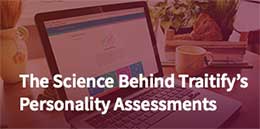Several factors can impede a great hire. A candidate’s credentials may look perfect on paper, for instance, then fail to translate in the office environment. Or a candidate who charms an interviewer may exhibit undetected negative traits when faced with challenging situations in the workplace.
Nor is it always effective to rely on input from former employers. These days, most employers will offer only factual information, such as dates of employment, concerning current or former employees, due to the threat of litigation. That’s why more employers are turning to personality tests as a way of getting meaningful insight into how candidates will behave under stress; how they’ll interact with colleagues; and whether they possess natural traits that fit with the employer’s core values.

Up to 60 percent of employers use workplace personality assessments, and almost one quarter of these assessments are used to evaluate job candidates, according to the Society for Human Resource Management.
But employers are faced with several challenges when it comes to incorporating personality testing into their hiring processes. One is with getting results that are valuable to their own unique situation – and then applying the data to their hiring practices in order to affect cultural changes in their organizations.
That requires more than generic information about, say, Candidate X’s degree of extroversion or inclination toward leadership. For the results to be truly useful in informing hiring decisions, they need to give insight into a candidates’ capacity for doing the things that they would actually be doing if they were hired. And results need to be compared not with the general population but with other people who already do the job the candidate is being considered for.
The Traitify Difference
That’s why Traitify’s process includes a study of the employees within a company so we can make a match between personality and fit at the individual company level.
The key is to establish an appropriate benchmark against which a candidate’s results can be measured. That way, assessment results show not only what the candidate’s personality is like, but how that personality will – or won’t – mesh with those of other employees in that particular company.

Another challenge employers face is simply getting candidates to complete a personality assessment. Many assessment products include hundreds of questions that can take an hour or longer to answer. Most people, especially those applying for hourly-wage jobs that tend to have high turnover, aren’t willing to spend that much time on an assessment. In fact, only about 20 percent to 30 percent of job candidates asked to take a traditional personality assessment actually complete one.
And when candidates abandon the assessment, they abandon the application process, meaning employers have fewer candidates to choose from.
But over 90 percent of candidates who start Traitify’s career assessment finish it, with a typical completion time of just two minutes.
Traitify users simply evaluate pictures on a phone or tablet, selecting “Me” or “Not Me” to indicate whether or not they identify with the picture. The test is simple and fun to take, yet each image measures multiple personality traits, and when the assessment is complete, a broad-spectrum personality profile has been created.
Traitify measures personality in degrees, instead of absolutes, as all individuals’ personalities run a spectrum of feelings, inclinations, and motivations.
Traitify assesses “soft skills,” such as those that show how employees work together. These types of skills are essential in most industries, but perhaps even more so in service-sector businesses like retail, hospitality, and restaurants. For example, a fast food chain seeking to separate itself from its rivals might do so, in part, by hiring employees who embrace core values such as a commitment to customer service.
That’s hard to do in a high-turnover industry like fast food, where managers hire people often. But just because employers make frequent hiring decisions doesn’t necessarily mean they want to make snap judgments. The right personality assessment helps them gauge whether a candidate will make a great employee.
For help with understanding how to best insert personality assessments into your hiring decisions, get in touch.




 Subscribe to Our Blog
Subscribe to Our Blog 
